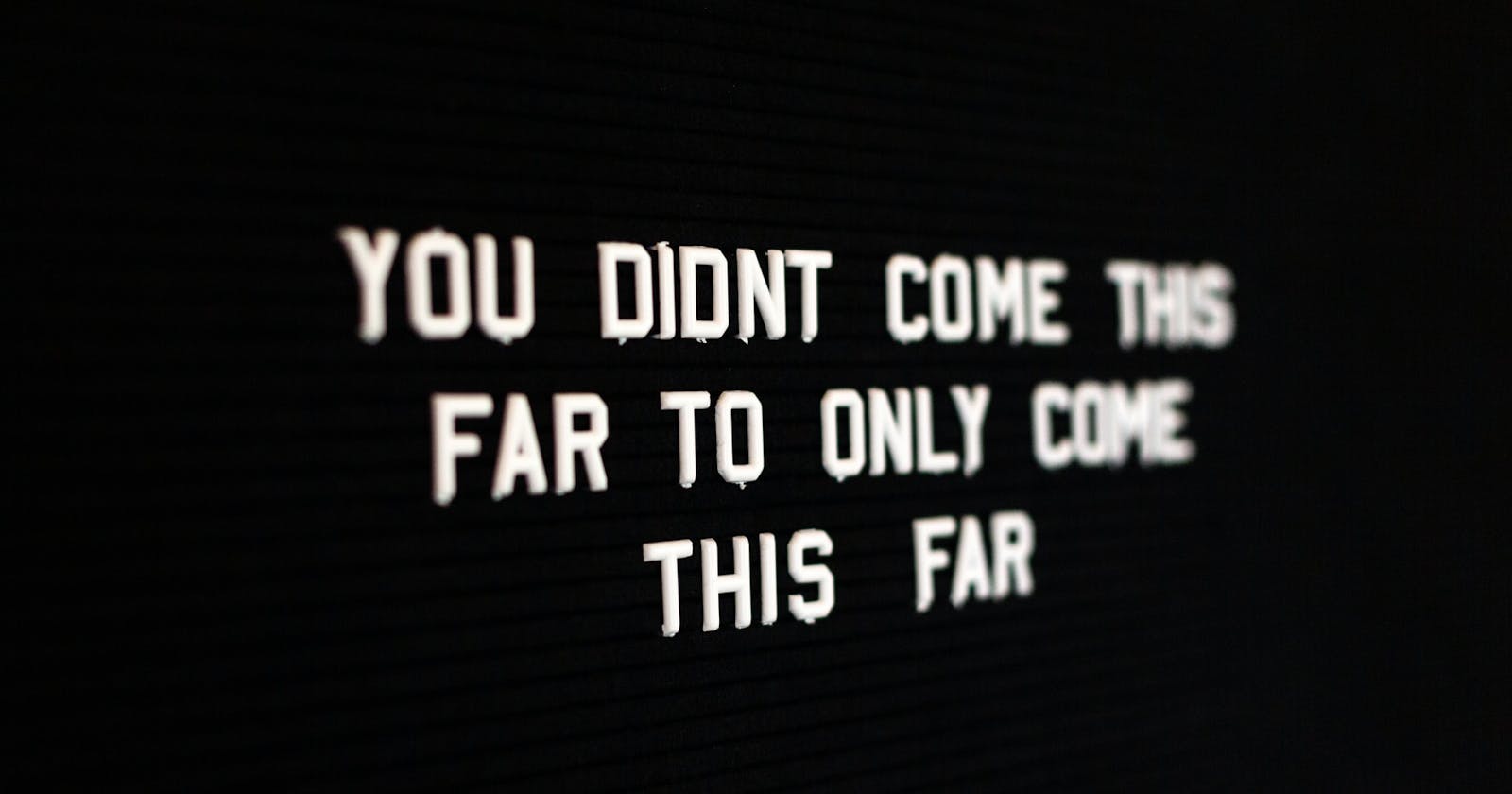There are so many tips on how to be productive and motivated. Here I listed some of the things that are working for me. You don't need to follow all of them. What works for someone, maybe won't work for you, so feel free to cherry-pick.
At the bottom, you'll find two exercises I derived from some psychotherapeutic exercise. They won't work miracles, but doing them in depth should help you improve your motivation and your planning ability.
We're prone to making easily achievable decisions faster and decisions we have to make an effort slower. So you want to make the wanted decisions easy to achieve and the decisions you don't want to make as hard as possible.
Limit the need for making good choices
Limit the time you spend making decisions. You can achieve that by erasing the choices that are the same every day ("I'm going to start to work now"). You achieve that by sticking to the routine. There are some choices, that can't be routine. They are different every time ("I'm going to work on that project"). You save yourself some time and nerves by planning ahead.
Routine
Maintain a weekly and daily routine. Some things will be the same every day (waking up, breaks, start and end of a workday)
Where a daily routine isn't possible or it doesn't make sense to do it every day, create a weekly routine.
Example of a weekly routine: Monday -> working on a blog Tuesday - Thursday -> current project Wednesday at 12.00 -> staff meeting Friday -> learning new things + longer lunch break
Many times we're given a false impression, that sticking to a routine will be effortless. Routine is weaker than a habit. That means sticking to a routine will still require some effort from you. Don't get discouraged by that, just stick to your routine.
Plan ahead
You have your routine down, but that's in general. You still need to know exactly what are you going to do in the days ahead. You know you'll write a blog on Monday, but what about? You'll work on your project on Tuesday, but which part? Have a plan in mind a week ahead (I'm having a meeting on Thursday, I'll push to production on Tuesday...). Just before you finish your work for today (not after that!), go through a plan for tomorrow.
If you'll sit down on your chair tomorrow and only then started thinking about what you're actually going to do, you'll lose so much energy. Worst case, you'll glide from one task to another and accomplish nothing.
Your plan has to be so clear that you can sit down in front of your computer and start right away.

Make unwanted choices harder to make
You start coding, decided to do a lot today, and after 7 minutes a notification pings. Either you'll check whatever notification or you'll keep wondering if it's something interesting. Either way, you lose focus.
You get to a though /boring task and you check social media, just for a second. Maybe you keep checking your emails in case it will be something important. You lose focus.
You make those decisions effortlessly. Maybe the tab is already open, the mobile phone is unlocked by the touch of your index finger... Make those decisions harder.
Leave your phone in another room (preferably upstairs). You're too lazy to go upstairs just for the sake of checking your notifications. Or turn it off. It takes forever for it to turn on, by then you'll already realize you're procrastinating.
Log out of social networks and mail clients. So used to already being logged in, you'll maybe open a Twitter page just to see you need to login and remember that that's not what you currently want.
If you have a basket of unfolded laundry in the same room, kick it out without hesitation.
If possible, don't work in the kitchen. A coffee maker and the fridge are way too close to you. Currently, the only place I can work in is our kitchen. I drink approximately 4 freshly brewed coups of tea per hour. I don't even want to count cookies.
Have a vision
It's hard to work for something if you don't know what that something is. You need to find something that drives you. If you work just for the sake of working, how will you continue when it won't be fun to work?
Why are you learning to code? Why are you learning this language? Why are you creating this program?
At the end of this post, you'll find two exercises that should help you create your vision. I strongly suggest you take the time and do them because good envisioning is sometimes the only thing that keeps you going.

Start your day with exercise
For me, a great way to start my day is going for a walk. Fresh air, simple movement, time to be with my thoughts. It is also a great time to envision my goals and plan ahead.
But it is very time-consuming and if you don't have the time for it, you can switch it for a light exercise. It will get your blood flowing and your body won't be nervous because of idleness.
There are many mobile apps that allow you to do full-body exercise in less than 10 minutes and that's a time you surely can spare. You can also do those exercises during your smart breaks.
Smart breaks
Planned. Regular. Well spent.
Don't take your break whenever you feel like it and however long as you want to. Let them be part of your routine. Know when you are taking them and how long they should be. Don't skip them.
One longer break in the mid of the day is not enough. The longer you go without break, the longer it will take you to get back to the start with your resources. There is no rule on how often and how long a break you need to take. Experiment a little, try to find out what works for you best.
Most of us probably spend our breaks scrolling Twitter/FB/news. This might surprise you, but that's a bad idea.
Stand up. Refill your water cup. Try to clear your mind of current coding problems. Stretch or do a short and light exercise. If you have time, go for a walk.
Don't sit and don't stare at a screen. That's what you've been doing before you took a break.
Keep it realistic
There are not enough motivation tools in the world to enable you to finish 47 tasks a day.
If you're setting you're expectations too high, you're setting yourself up for disappointment.
If your kids are in school/kindergarten from 9 AM to 3 PM, you can't work 9 hours. If you have a day job, you can't post a blog/long thread 5x/week. You can't learn a new framework in a week.
Expecting too much from yourself will make you only do less. Setting realistic goals and achieving them will make you motivated. Failing to meet your goals (almost) every time, will just make you question your ability.
Another side of being realistic is not having too low expectations. If you'll reach your goals without any effort, you'll get bored. If you'll reach your goals and nothing will change, you'll get frustrated.
Set good goals. Those two exercises can help you with that.
Motivation exercises
Here I'm presenting two exercises that are very similar in their execution. One is meant for you to go over your past accomplishments and the other is meant to create a vision, goals, and a plan to achieve them. Knowing where you came from and why are you doing what you're doing can be very motivational.
I advise you not to do both exercises at once. Take your time. It's not about drawing, it's about thinking.
For both exercises, you'll need a piece of paper and colored pencils.
River of coding's past
This exercise can help you appreciate what you already achieved. Too often we rush toward some goal and don't stop to 'smell the flowers'.
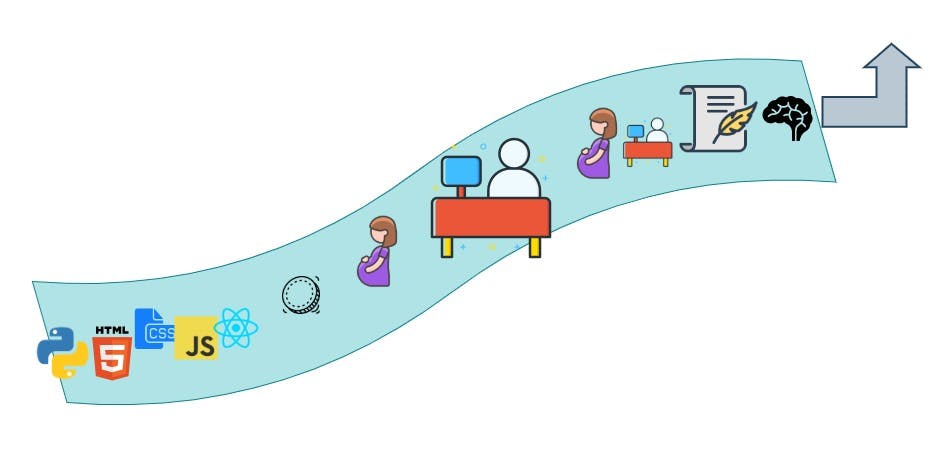
Draw a little circle on the left side of the paper for when you started your coding journey.
Next to it, draw a symbol that represents your beginnings.
On the right side of the paper (on whatever height you want) draw a little circle for the present moment.
Add a symbol that represents the current moment of your learning.
Draw a line between those two points that represent your journey until now.
If your learning was steep, let the line represents that. If you quit for a while, dot the line. Draw the motivation drop and when you learned something huge.
Add symbols along the line for the important moments.
When you felt that you learned CSS. When you started to learn Python or felt that you mastered JS. Whey you got your first job interview or landed your first job. When you had to take time off coding because you got a baby. Amazing things you created and all the projects you finished.
Whatever feels important to you and is somehow related to coding. When you finish that, you should have a piece of paper that fairly represents your journey. It should show the troubles you overcome and the new knowledge you acquired.
Examine your journey and be proud of what you achieved.
Try to remember that filling you got when you finished your first project. Try to experience again the excitement you felt when you got that job you wanted.
Put your index finger on the circle that represents
NOW. Close your eyes.Imagine the time your learning will be over (in general; We never really stop learning). How will you know that you achieved your goal? What will be different for you? How will you feel like? What will it look like? What will you do when that time comes?
This is a really important part of the exercise, so don't rush through it just hastily answering the questions I provided. Visualize it, put yourself in that moment.
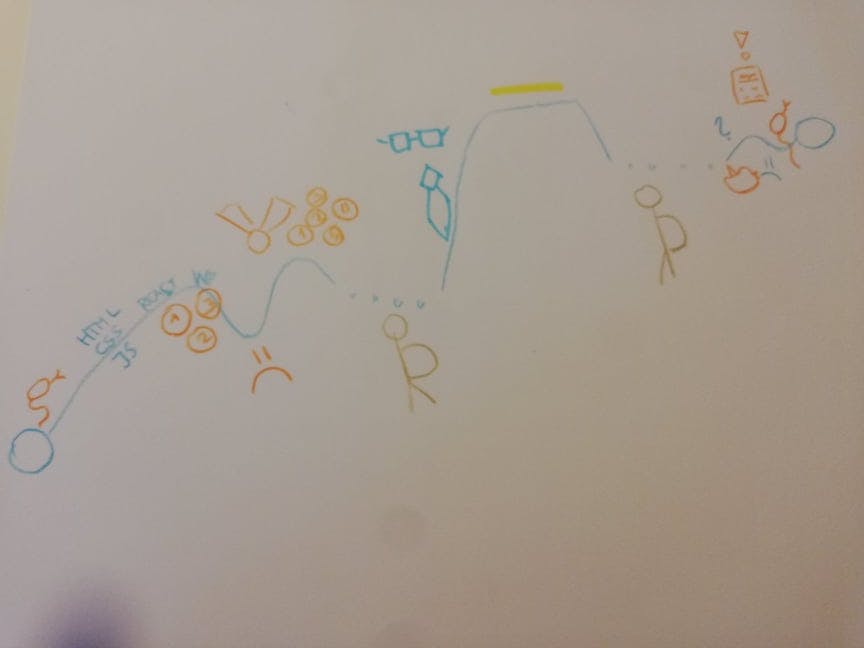
River of coding's future
That exercise will help you envision your future as a developer. As explaining before, defining your goals is essential. Fantasizing about your vision and goals can get you through the rough patches.
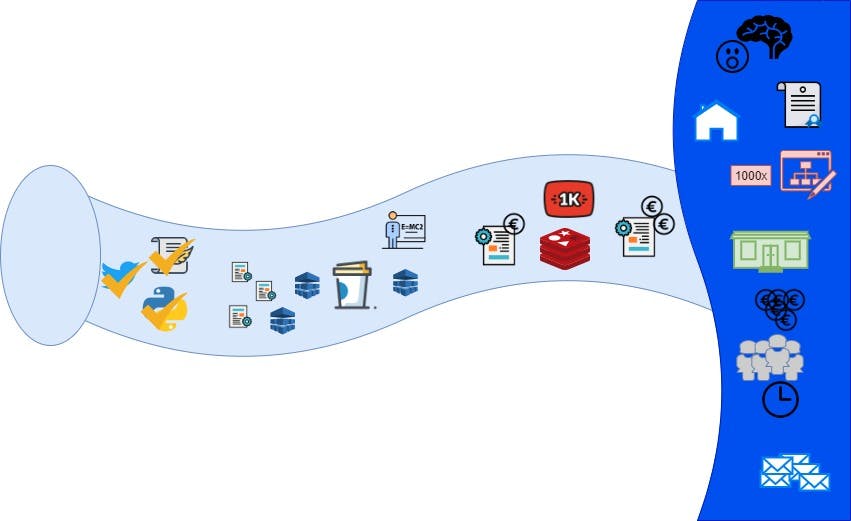
On the right side of the paper draw the Ocean of Success. In the ocean, draw symbols for what you want to achieve.
What programming languages you want to learn or be an expert at? Do you want to be your own boss? What is the paycheck you desire? What do you want that money for? Do you want to start a blog, do you want to achieve a certain number of followers/readers...
Those are just suggestions, don't limit yourself to them.
On the left side of the paper, draw a water spring.
That's where you are right now. You can add a symbol that represents you at a current moment.
Between the spring and the ocean draw a river any way you want to. Put symbols on the river for the important parts of your plan.
If you want to land a FE job, you need to learn HTML/CSS/JS. If you want a promotion, you need to learn that framework... If you want to be your own boss you need to achieve financial stability and quit your day job. If you want to have a certain number of readers, you need to start a blog or be more regular at posting.
Put your finger on the spring and slowly follow the stream. Envision the path between you and your main goal.
What do you have to do to get to the ocean? How are you going to get there? What will be the struggles you'll have to overcome? Try to really imagine it.
Put the paper somewhere near you. When you achieve something that is drawn on your river, color it, mark it.
Be proud of yourself. You're getting closer to the ocean...
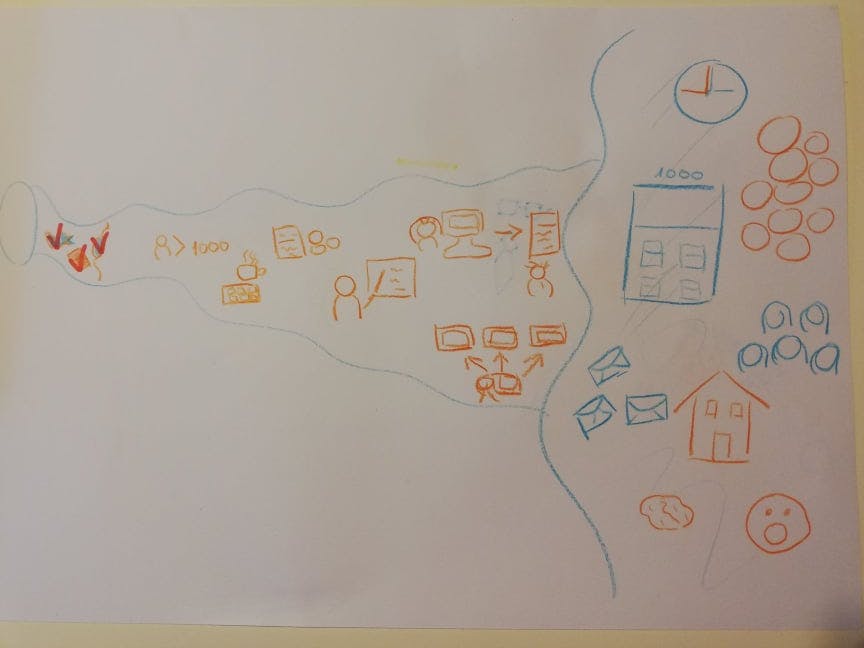
Conclusion
Motivation doesn't just fall from the sky. Highly motivated people weren't born with it. They worked for it.
If you feel unmotivated for some time, come back to those exercises. See if your goals have changed. It's hard to pursue goals we no longer wish for.
Maybe your routine is not working for you anymore. Or maybe you're just tired.
Don't judge yourself if you feel unmotivated, even though you're trying sooo hard.
Sometimes we all need just a little rest.
Images are from Unsplash. Creators: Drew Beamer, Dad hotel, Randy Tarampi.

